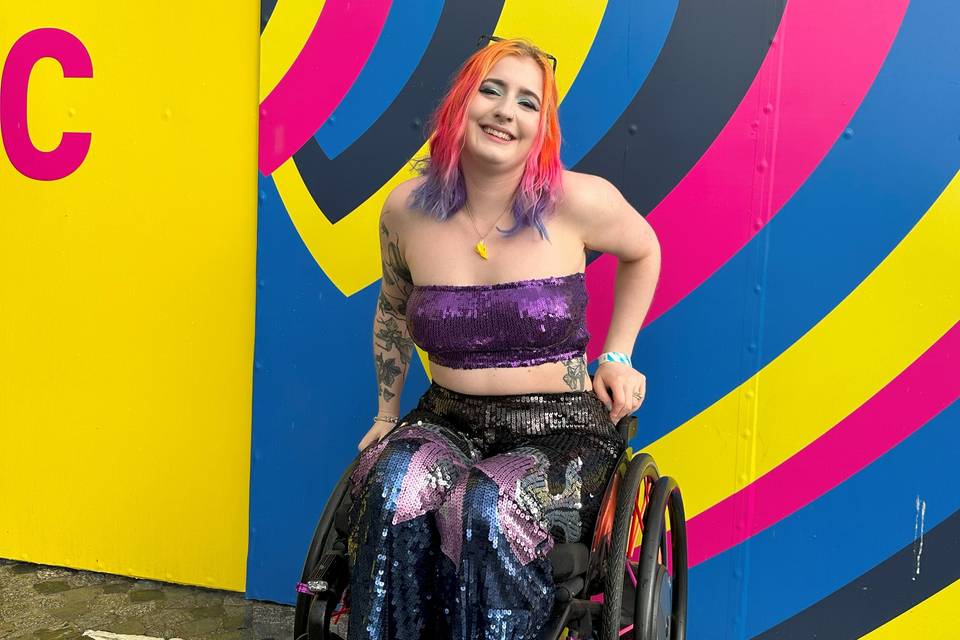Why Is It Harder for Disabled People To Get Married?
Disability activist and influencer Eliza Rain shares their experience on how moving in with a partner or getting married impacts disabled people financially


Please note: Hitched and the materials and information it contains are not intended to, and do not constitute, legal or financial advice and should not be used as such. You should always consult with your advisors about your specific circumstances.
Let me set the scene for you. You go on a first date, begin dating someone, realise you've met 'the one' and want to take things to the next level.
For most couples, moving in together is the next major step before getting engaged and tying the knot, but for disabled people, that decision can come with hefty financial consequences.
Did you know that, moving in with a partner can impact your benefits - or as I prefer to call it, government income. I've never liked the term benefits, as I don't think it should be a benefit to receive basic income support to buy basic necessities - but that's just my opinion!
But, unfortunately, for many people, and in particular, moving in with a partner can have a huge impact on the level of financial support you are entitled to from the government.
The Facts
In the UK, there are certain benefits which are called 'means tested', meaning you have to prove you need it to be granted the funds. An example of this is universal credit, which is defined by the government as, "A payment to help you with your living cost."
The PIP benefit, which is the monthly disability payment, is not means tested, and therefore you are entitled to it regardless of your income or living situation.
So, for disabled people, there is a benefit which can be accessed regardless of relationship status, living situation or income, but the issue is that PIPs are notoriously difficult to access, and the maximum amount of money you can receive per month is £691 - and that's just for people who are eligible for both the daily living and mobility payments at the highest tier.
According to data acquired by Scope UK, it costs on average an additional £975 per month to live as a disabled person and have the same standard of living as a non-disabled person, and if these figures were adapted to account for the inflation which we've seen in the last two years, that number would rise to £1,122.
I'm not a financial expert, but it doesn't take a genius to see the gap between the PIP allowance and the amount of money required, which is why means tested benefits are so important to disabled people as they really help to close the gap between which can be found between disability benefit levels and the amount needed to sustain a good quality of life.
The Reality

As disabled people, you can see how much additional income we need to simply just exist - and for those who are unable to work or earn as much, means tested benefits are vital to close that gap.
But the issue with a lot of means tested benefits is that they are in jeopardy when you decide to live with a partner. Moving in with a partner or getting married can cause you to lose your means tested benefits, but why?
Well, my understanding of this is that, in the government's opinion, when you are married or in a habituating relationship, you will be financially supporting each other. However this doesn't take into consideration all types of relationships, including those with unsafe dynamics and those with additional, individual needs and costs to account for.
The truth is, this decision heavily impacts those people who are of a minority, and specifically those living with a disability. As well as the physical implications of not being able to safely care for yourself due to lack of funds, emotionally, this can lead to disabled people feeling like they are a financial burden to their partner, which is absolutely not the case.
My Experience
I am not a financial expert, nor am I someone with extensive knowledge on the law and government policy, but I am a wheelchair user who talks a lot about disability rights online, and have experienced the consequences of this situation first hand.
When I was making the decision to officially move in with my partner, there were a lot of discussions we needed to have. It's fairly normal to talk about finances when taking that next step in your relationship, but for us, it was very much centred around whether or not we could afford to live together.
For most people, moving in together is more financially viable, sharing rent or mortgage payments between two people instead of one usually takes some of the pressure off. But for us, we had to carefully consider whether this was doable for us because of the impact moving in together would have on my government income.
I am very lucky in that I am able to work now, and living with my partner was something I was able to afford doing, but for a large chunk of our relationship, working wasn't something that was accessible for me, and that could have really impacted our ability to live together.
Although we are able to afford a life together now, the current legislations leave me with so many questions - what if I become unwell again and can no longer work - will we be able to afford our rent? How much funding would I be granted? Will there be a financial strain on us? Will this force my partner to work more than they should be?
These are questions that many non disabled people don't have to consider, as working options are much more accessible for them. Whereas, for me, I don't have the option to work many jobs due to access and health issues.
The Solution

It's important to say that this topic is nuanced, and there are plenty of questions that I certainly can't answer.
How do we ensure that those who need the additional support get it? What if someone moves in with someone who can support the additional costs they have?
I an not an expert, and I don't have all the answers. All I do have are my lived experiences and those around me who have experienced the same, including disabled people who are choosing not to live with partners and get married because of the financial impact it will have on them. This shouldn't be a worry for anyone, especially disabled people who require over £1,000 more than non disabled people to simply just live.
As always, I am just one disabled person sharing my own opinions and experiences, and I can't speak for an entire community, but I can tell you that something needs to change.
No one should have their funding stopped or changed because they decide to commit to a partner. Your income should be kept separately and you should be allowed to maintain financial independence while living with someone or marrying them.
Disabled people should be able to live with partners and keep their income and independence. We shouldn't feel stressed or worried about income when we choose to move in with a loved one!
Want more from Eliza? Read their #AlreadyWeddingReady story, where they share their experience planning a wedding as a wheelchair user.








